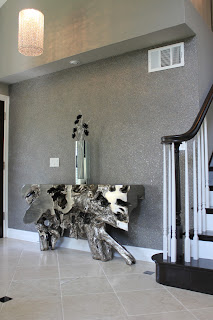Vero and Cottonwall, ASID Industry Partner
There are times when we are challenged with making a space
feel more intimate and cozy. Textured wall coverings can help accomplish your
vision bringing an organic architectural element to a space. Now more than ever,
we have many sustainable design options.
 |
| 100% Silk with Effect Material |
In the past, most textured wall coverings contained vinyl.
The vinyl used in these products consisted of high VOC’s and solvent based inks
and dyes. Today, there are more eco-friendly finishes offered that are vinyl
free, use water-based dyes and inks and contain little or no VOC’s. Recycled paper, cork, bamboo,
grass cloth, and cotton are some of the materials used to create textured
coverings. Grass cloth and cotton comprised of all-natural fibers generate a
breathable, mold-resistant living space. Some like US
Cottonwall, for example, offers acoustic values reducing noise and echoes,
making the product ideal for theater rooms, large noisy office and restaurant
spaces, and anywhere indoor comfort and serenity is desired.
 |
| Bama Silk |
When choosing a
recycled paper, V2 tiles by Mio are preferred. The tiles can be arranged in various
ways to add unique architectural design and depth to a room. Another option is
Japanese plant based wall treatments like straw which claim to give “spiritual
healing.” US CottonWall, is a hand
trowelled, seamless, bio-based cotton plaster. Made with renewable materials,
this high-density wall finish offers customizable creations
with the use of mica chips, a selection of glitters, and metallic threads. Each
individual order is hand dyed specific to the job and no materials are wasted.
All extra material is set aside in case of future repairs, which are simple and
not noticeable for the life of the plaster. Most wall coverings on the market
today last at least 10 years. Less waste is created when you can patch a
damaged wall opposed to striping and re-plastering or re-applying wallpaper.
 |
| Gray Granite |
How and where these products are manufactured are also important
questions to ask when helping to create a viable ecologically friendly space. All of these natural
products help designers, architects, and engineers earn LEED points and at the
same time, improve the quality of our environment and that of generations
thereafter. There are innovative products being introduced to the market every
day. It’s your responsibility to get educated and make sure the products you
are selecting are indeed green, so
you can put these fine finishes to work on your next project knowing you have
made a responsible decision for our environment as well as a warm, welcoming
atmosphere for your clients to enjoy for years to come.
Vero,
founded in 2001, is the national distributor of Italian seasoned slaked lime
and resin plaster finishes for interior and exterior wall surfaces. The Resort
at Pelican Hill in Newport Coast, CA is an example showcasing the authentic
products. They recently introduced a line of all-natural, bio-based cotton
fiber plasters for interior quiet and cozy spaces. Customers may choose from
hundreds of standard colors, or they can match any color specified. Visit their showroom in Orange, CA.
Instructional classes offered. Please contact Melissa Higgins at 714.637.7341.
2911 N.
Orange-Olive Rd.
Orange, CA
92865
Blog address, Spread The Plaster
